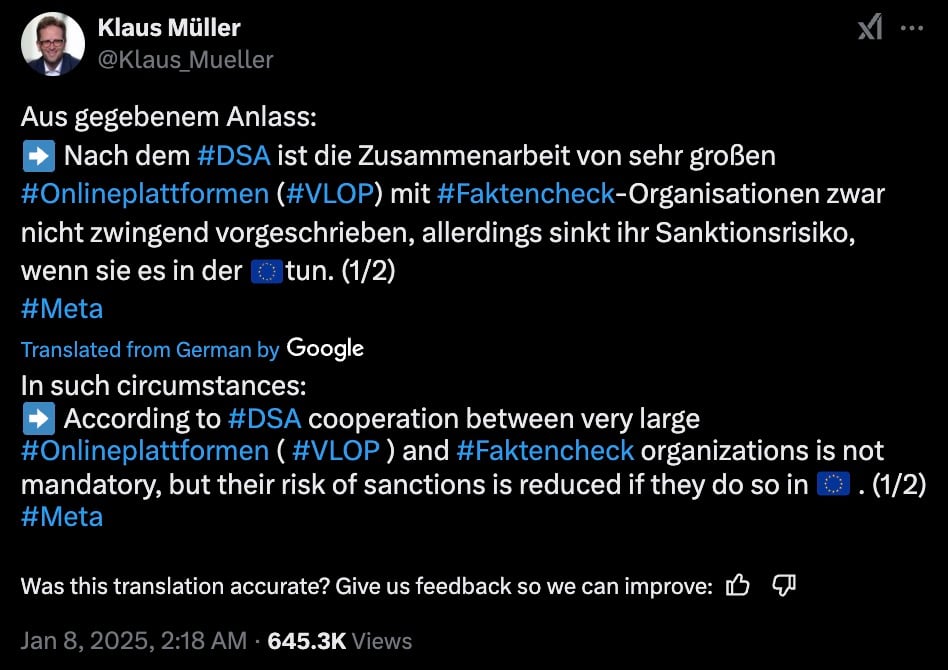This week’s statement by CEO Mark Zuckerberg, and the realization that Meta’s policy shift regarding free speech on the giant’s social platforms doesn’t necessarily end with the US – is clearly sending shivers down the spine of a particular political class in Europe.
The one that, at least currently, gets to do all the talking – and gets that talking reported as gospel by legacy media.
And so, officials in a number of EU countries as well as some members of the European Parliament (MEPs) are scrambling to respond to Meta’s announcement – in a way, it seems, simply as an emergency measure to protect their narrow political, rather than what may be their nations’ long term, greater interest.
The people’s interest, meanwhile, is always the same: being able to speak freely as the very first point of assurance, that we do indeed, live in a democratic way.
But – the bureaucracy obviously has a different agenda.
Meta, as the first of the true tech giants to “turn the free speech ship around” does appear to be following in the footsteps of what Twitter/X has already been doing for several years.
And Meta’s change in policy is, in the grand scheme of things, still minor – Meta is simply now dropping the notorious third-party “fact-checkers.”
But, a number of EU officials and representatives of various agencies are wasting no time making themselves and their priorities known. And free speech, by way of welcoming less online censorship, does not come across as any priority.
Instead, they are warning Meta against abandoning the services of the “Censorship Central” – aka, “fact-checkers” – while at the same time looking to “energetically” pursue the existing investigation against X.
German Federal Network Agency head Klaus Muller is one of those appearing to be trying to stem the free speech tide, all the way to threatening to impose “sanctions” against Meta – should the company decide to extend its new, freedom-respecting policies to Europeans, after Americans start enjoying this privilege first.

Muller made his threat from the position of potentially fading, but still power (pending the February German elections) – he has links to Germany’s Green Party. And Muller speaks about the consequences, should Meta stop using “fact checkers” in Europe as well.
“According to the DSA, the cooperation of very large online platforms (VLOPs) with fact-checking organizations is not mandatory,” Muller posted on X, referring to EU’s online censorship law, the DSA.
However, the second part of that post comes with some worryingly ominous overtones: “But their (VLOPs) risk of sanctions is reduced if they do so (work with ‘fact-checkers’) in the EU.”
… so – are we all in Goodfellas now?
Meanwhile in France, Foreign Minister Jean-Noel Barrot has turned to the EU Commission for reassurance and demands that existing censorship laws are applied both at the bloc’s level, and that of member states.
In response to the mortifying idea of banning social sites like X and having that be the decision of actual, European, nation states – the French official is quoted as saying – apparently mortified in his own right:
“Either the European Commission applies with the greatest firmness the laws that we have given ourselves to protect our public space, or it does not do so and then it will have to agree to give back the capacity to do so to the EU member states.”
Among the MEPs who are perplexed by the pro-free speech developments on the other side of the Atlantic right now, and willing to talk about it, are obviously Germany’s Greens – seeing how it’s campaign time over in that country – but also some from Sweden, Denmark, and then, there’s the “pro-EU federalist” Volt Germany, that all share pretty much the same sentiment.
Right now it’s mostly about X – but wait until the news of Meta’s policy change reaches everybody in the EU. And that might, for some “policymakers,” happen via snail mail.
In the meantime, the overall message in the EU is to go after social networks based on the DSA’s controversial rules, by getting those “stepped up” – EC digital czar Henna Virkkunen and Ireland’s Michael McGrath, EU’s Commissioner for Justice and Democracy, both spoke about “energetically” enforcing DSA rules as the basis for investigating X.
This urgency may or may not seem true at this point though – since the probe was first launched in October 2023.
Last, but by no means least – and Elon Musk responds to those MEPs who agreed to Turning Point USA founder and CEO Charlie Kirk for Europe’s comments about the incoming US administration’s commitment to – Europe.
“For 80 years, Americans have been made to spend trillions of dollars to ‘protect democracy’ in Europe. Even now, Europe is utterly dependent on America for its own security. The hundreds of billions of dollars we’ve spent in Ukraine have all been to protect Europeans,” Musk posted, and added:
“If all this is going to happen, then at a minimum, Europe should actually be FREE — with real free speech and real elections. The Trump Administration should be clear: Future American military, economic, and diplomatic support for Europe is dependent on a continued right to free speech.”
But this might be a hard pill to swallow – since most European states have long since criminalized speech.
Nevertheless, writes Musk: “If Europe wants China-style speech controls, then they can pay for it themselves, and our protections will be removed.”








